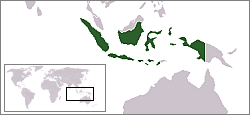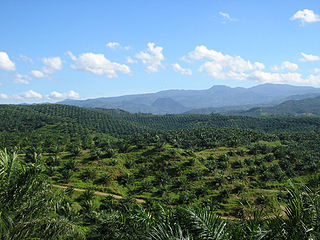
Palm oil is an edible vegetable oil derived from the mesocarp of the fruit of the oil palms. The oil is used in food manufacturing, in beauty products, and as biofuel. Palm oil accounted for about 36% of global oils produced from oil crops in 2014. Palm oils are easier to stabilize and maintain quality of flavor and consistency in ultra-processed foods, so are frequently favored by food manufacturers. On average globally, humans consumed 7.7 kg (17 lb) of palm oil per person in 2015. Demand has also increased for other uses, such as cosmetics and biofuels, creating more demand on the supply encouraging the growth of palm oil plantations in tropical countries.
Sinar Mas is one of the largest conglomerates in Indonesia. It was formed in 1938. It has numerous subsidiaries including Asia Pulp & Paper and palm oil producer PT SMART. The company also acquired Berau Coal Energy from Asia Resource Minerals PLC, a major mining group founded by Nathaniel Philip Rothschild, in a takeover initiated by Fuganto Widjaja.

IOI Corporation Berhad, commonly referred to as IOI, was incorporated on 31 October 1969 as Industrial Oxygen Incorporated Sdn Bhd. IOI is one of Malaysia's biggest conglomerates. It ventured into property development in 1984, followed by oil palm plantations and refineries in 1985. IOI was listed on the Kuala Lumpur Stock Exchange (KLSE) and trading as MYX: 1961—now known as Bursa Malaysia—in 1980.
Neste MY Renewable Diesel is a vegetable oil refining fuel production process commercialized by the Finnish oil and refining company Neste. Whether as an admixture or in its pure form, Neste MY Renewable Diesel is able to supplement or partially replace diesel fuel without problems. Neste MY Renewable Diesel guarantees that every gallon sold meets ASTM D975 and EN 15940 specifications in compliance with OEM standards.

Olam International is a major food and agri-business company, operating in 60 countries and supplying food and industrial raw materials to over 20,900 customers worldwide. Its value chain includes farming, origination, processing and distribution operations.

The Southeast Asian haze is a fire-related recurrent transboundary air pollution issue. Haze events, where air quality reaches hazardous levels due to high concentrations of airborne particulate matter from burning biomass, have caused adverse health, environmental and economic impacts in several countries in Southeast Asia. Caused primarily by slash-and-burn land clearing, the problem flares up every dry season to varying degrees and generally is worst between July and October and during El Niño events. Transboundary haze in Southeast Asia has been recorded since 1972 with the 1997 and 2015 events being particularly severe.

The environment of Indonesia consists of 17,508 islands scattered over both sides of the equator. Indonesia's size, tropical climate, and archipelagic geography, support the world's second highest level of biodiversity after Brazil.

Asia Pacific Resources International Holdings Limited, or APRIL, is a developer of fibre plantations and the owner of one of the world's largest pulp and paper mills with operations mainly in Indonesia and China. APRIL mainly produces bleached hardwood kraft pulp and uncoated, wood-free paper, including its Paperone brand of office paper. Founded in 1993, APRIL is managed by Royal Golden Eagle and owned by Indonesian business man Sukanto Tanoto living in Singapore. Royal Golden Eagle also manages companies in paper, palm oil, construction, and energy business sectors.
This article addresses various criticisms of Cargill Inc, a privately held "agribusiness" multinational giant" with operations in 70 countries and its headquarters in Minneapolis, Minnesota, in the United States. Cargill Inc, which has been owned by the Cargill family for 154 years, is the largest privately owned corporation in the United States, with an annual revenue of $113.5 billion in 2019.
Palm oil, produced from the oil palm, is a basic source of income for many farmers in South East Asia, Central and West Africa, and Central America. It is locally used as cooking oil, exported for use in much commercial food and personal care products and is converted into biofuel. It produces up to 10 times more oil per unit area than soybeans, rapeseed or sunflowers.
Wilmar International Limited is a Singaporean food processing and investment holding company with more than 300 subsidiary companies. Founded in 1991, it is one of Asia's leading agribusiness groups alongside the COFCO Group. It ranks amongst the largest listed companies by market capitalisation on the Singapore Exchange (SGX), being the second largest as of September 2010. It was ranked 211th in the Fortune Global 500 list in 2020. It was ranked 3rd in the World's Most Admired Company by Fortune in 2019.

Deforestation in Indonesia involves the long-term loss of forests and foliage across much of the country; it has had massive environmental and social impacts. Indonesia is home to some of the most biologically diverse forests in the world and ranks third in number of species behind Brazil and the Democratic Republic of Congo.
Royal Golden Eagle is a global integrated, resource-based industrial group, with businesses in paper, palm oil, viscose, construction and energy, property and asset management. Owned by Indonesian businessman Sukanto Tanoto, the group employs 60,000 people worldwide with assets exceeding US$30 billion.
Bumitama Agri Ltd is the Singapore holding company of subsidiary Bumitama Gunajaya Agro. Bumitama is an Indonesian oil palm plantation company which cultivates oil palm trees and produces crude palm oil (CPO). It was established in 1996 by the Harita Group with its first acquisition of land in Central Kalimantan. Bumitama owns roughly 230,000 hectares and has planted 187,000 hectares of oil palm trees, primarily in Central and West Kalimantan. Bumitama owns 14 CPO mills, which produce more than 1,000,000 tons of CPO a year. Primary purchasers of their CPO include Wilmar International, the Sinar Mas Group and Musim Mas. In April 2012, Bumitama Agri presented an IPO on the Singapore Stock Exchange.

GreenPalm is a certificate-trading program for "sustainably produced" palm oil. Established in Hull, England, in November 2006, GreenPalm is a trading name of Book & Claim Ltd., "a wholly owned subsidiary of" AarhusKarlshamn UK Ltd.

Palm oil production is important to the economy of Indonesia as the country is the world's biggest producer and consumer of the commodity, providing about half of the world's supply. In 2016, Indonesia produced over 34.6 million metric tons of palm oil, and exported 25.1 million metric tons of it. Oil palm plantations stretch across at least 12 million hectares. There are several different types of plantations, including small, privately owned plantations, and larger, state-owned plantations. There are a variety of health, environmental, and societal impacts that result from the production of palm oil in Indonesia. A recent publication by the NGO Rainforest Action Network (RAN) indicates that the use of palm oil by some of the biggest chocolate and snacks' producers is increasing this problem.

Musim Mas Group operates globally in the palm oil industry, with a presence in 13 countries spanning Asia-Pacific, Europe, North America, and South America. The group owns a significant network of palm oil refineries and is involved in vegetable oil refining. Additionally, it manufactures consumer goods such as soap and cooking oil brands in Indonesia. With a workforce of 37,000 employees, Musim Mas is supported by an extensive logistics network consisting of chemical and coastal tankers, barges, tugboats, and bulk installations at major ports in Indonesia and other strategic locations worldwide.

Asian Agri is one of Asia's largest palm oil producers, with an annual production of 1 million tons of palm oil.

The 2010 Southeast Asian haze was an air pollution crisis which affected many Southeast Asia countries such as Indonesia, Malaysia and Singapore during the month of October in 2010.
Globalization of supply chains and pressure to lower production costs have negatively impacted environments and communities around the world, especially in developing nations where production of high demand goods is increasingly taking place. Since the 1990s, awareness of these negative impacts has grown, leading stakeholders to push companies to take responsibility and actively work to improve the sustainability of their supply chains. It has come to be understood that a company is only as sustainable as the start of its supply chain, bringing about the need for sustainable sourcing. Sustainable sourcing refers to the inclusion of social, environmental, and economic criteria in the sourcing process.












